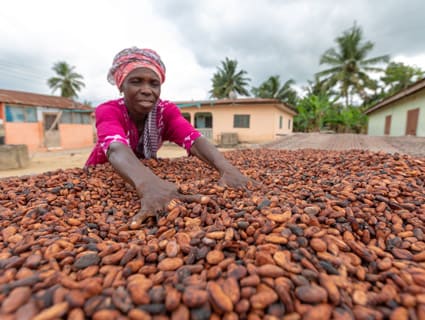‘If you want to go far, go together’: 10 ways this African proverb sums up a decade of progress for cocoa communities
Read Time: 5 minutes
January 10, 2023
 When you think about cocoa, what comes to mind?
When you think about cocoa, what comes to mind?
For you, maybe it’s the rich flavor of chocolate as you bite into a cookie or sip a warm drink.
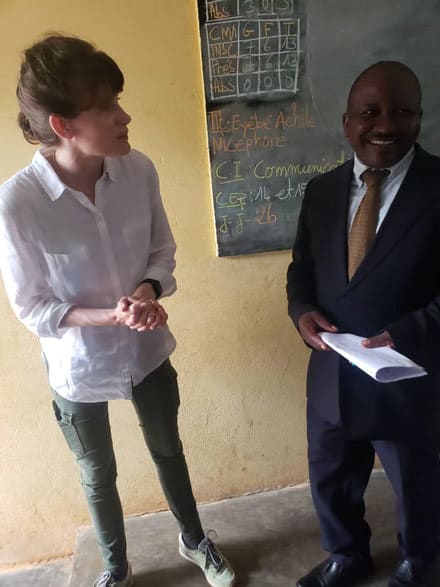 I recently had the opportunity to visit a school in Obala, Cameroon — in the heart of this important cocoa-producing country.
For me, it’s the caring face of a Cameroonian teacher, greeting me during a recent visit to his school in Obala, the heart of an important cocoa-producing country.
I recently had the opportunity to visit a school in Obala, Cameroon — in the heart of this important cocoa-producing country.
For me, it’s the caring face of a Cameroonian teacher, greeting me during a recent visit to his school in Obala, the heart of an important cocoa-producing country.
Calm, patient and devoted in the face of minimal resources, the head teacher shared how one of our programs with Nestlé invested in new latrines for boys and girls, blackboards, tables, books and even a scholarship program for students. How he was seeing more kids in school and, as a result, their mothers with more free time to work to support their families and enhance their families’ livelihoods. How he felt more dignity in his profession and more inspiration for his community to excel.
In this moment, it all became clear. When we created the Cargill Cocoa Promise a decade ago, we knew helping the cocoa sector thrive meant building on our work to enable farmers and their families to be more resilient, have more choices and access more opportunities. Over time, we’ve seen the benefits spread to many families, children, community members and the planet we share. The ripple effect is incredible.
What is the Cargill Cocoa Promise?
It’s the cornerstone of our cocoa sustainability efforts in Côte d’Ivoire, Ghana, Cameroon, Indonesia, Brazil and, more recently, Ecuador. The Cargill Cocoa Promise program helps farmers and their communities achieve better incomes and living standards while also growing cocoa sustainably. Learn how.
When it comes to the Cocoa Promise, I’m a believer in the power of collective progress, all together. Here are 10 reasons why I think you should believe, too.
1. More farmers are producing safe, sustainable cocoa.
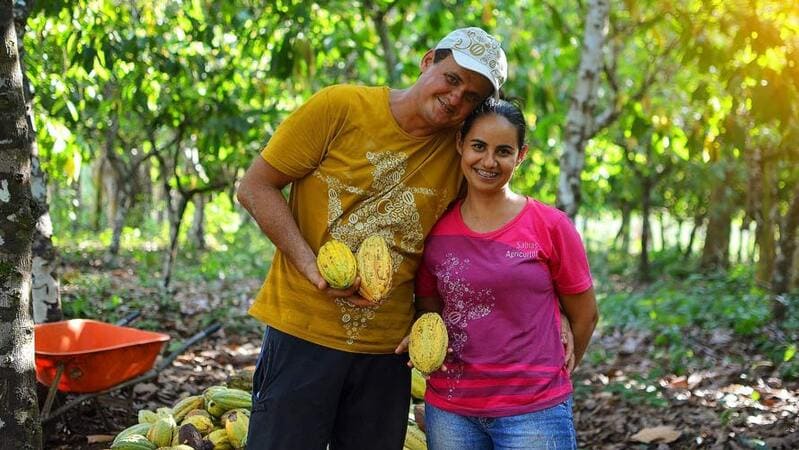 We know the cocoa industry depends on the success of farmers. That is why we are training and coaching a growing number of them — including more than 244,000 farmers in 2021 alone. The aim? Building farmers’ capacity to increase their yields without encroaching on new land, to make their farms more profitable businesses, and to ultimately provide consumers with more quality, sustainable food.
We know the cocoa industry depends on the success of farmers. That is why we are training and coaching a growing number of them — including more than 244,000 farmers in 2021 alone. The aim? Building farmers’ capacity to increase their yields without encroaching on new land, to make their farms more profitable businesses, and to ultimately provide consumers with more quality, sustainable food.
2. Cocoa farming families are finding different ways to make a living income — from hot chocolate to hot peppers.
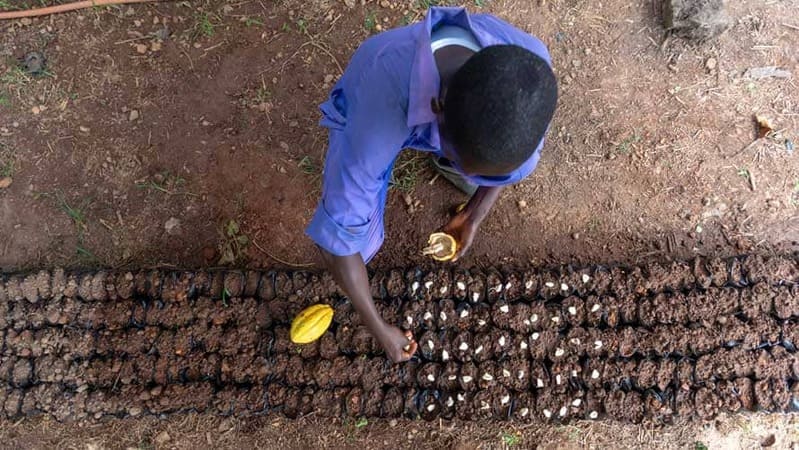 Making a living income as a cocoa farmer can be incredibly challenging. So, we’re focused on helping farming families find new ways to increase their household income. Case in point: our Veliche gourmet chocolate brand helps empower farmers to become “agripreneurs” through an entrepreneurial training program. We have helped 1,800 cocoa farmers in Ghana earn extra income by producing, of all things, hot peppers. And in Cameroon, our partnership with LadyAgri is helping more women develop small businesses.
Making a living income as a cocoa farmer can be incredibly challenging. So, we’re focused on helping farming families find new ways to increase their household income. Case in point: our Veliche gourmet chocolate brand helps empower farmers to become “agripreneurs” through an entrepreneurial training program. We have helped 1,800 cocoa farmers in Ghana earn extra income by producing, of all things, hot peppers. And in Cameroon, our partnership with LadyAgri is helping more women develop small businesses.
3. An innovative system is helping keep children off farms and in schools.
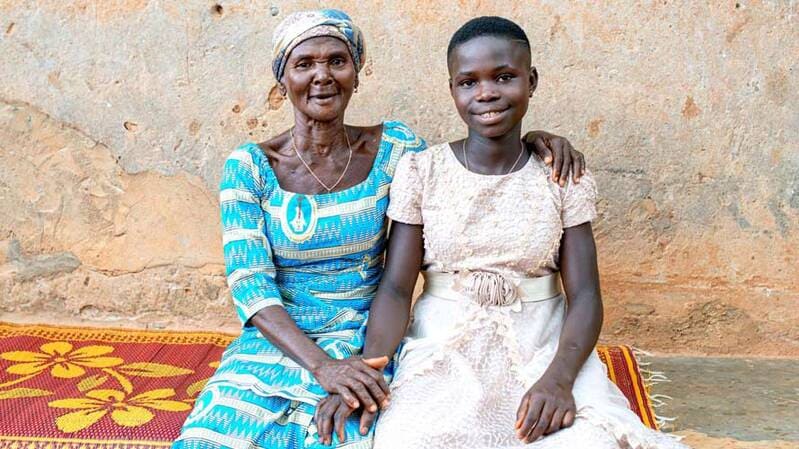 It is no secret that child labor is an issue in cocoa communities. To tackle it, we worked with the International Cocoa Initiative to design an innovative Child Labor Monitoring & Remediation System (CLMRS) to address, prevent and remediate child labor. By 2025, we aim to reach all farming households in our direct supply chain across Brazil, Côte d’Ivoire, Ghana, Cameroon and Indonesia, where our partnership with Save the Children focuses on protecting children’s rights. Ultimately, these systems mean more children — like Anne — are able to attend and finish their schooling.
It is no secret that child labor is an issue in cocoa communities. To tackle it, we worked with the International Cocoa Initiative to design an innovative Child Labor Monitoring & Remediation System (CLMRS) to address, prevent and remediate child labor. By 2025, we aim to reach all farming households in our direct supply chain across Brazil, Côte d’Ivoire, Ghana, Cameroon and Indonesia, where our partnership with Save the Children focuses on protecting children’s rights. Ultimately, these systems mean more children — like Anne — are able to attend and finish their schooling.
4. More women are empowered in cocoa communities.
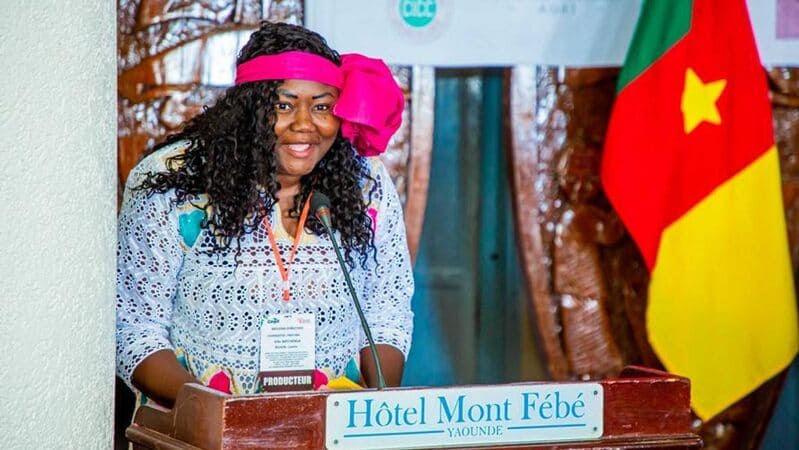 I’ve seen firsthand how empowered women — entrepreneurs like Marie and leaders like Mavis — lead to empowered cocoa communities. That is why we have helped more than 700 women leaders of farmer organizations learn business skills through our Coop Academy and more than 11,000 women access Cargill-supported savings and loans program to help run businesses that support their families. The result: more stable incomes and, ultimately, more resilience for cocoa farming families.
I’ve seen firsthand how empowered women — entrepreneurs like Marie and leaders like Mavis — lead to empowered cocoa communities. That is why we have helped more than 700 women leaders of farmer organizations learn business skills through our Coop Academy and more than 11,000 women access Cargill-supported savings and loans program to help run businesses that support their families. The result: more stable incomes and, ultimately, more resilience for cocoa farming families.
5. Technology helps us see (and address) deforestation risks.
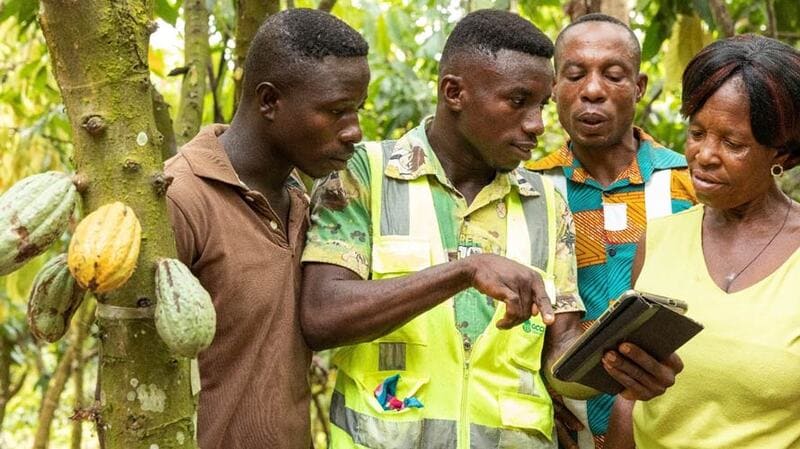 To truly become deforestation-free, we need farming landscapes that are sustainable — those that balance producing cocoa and caring for our planet. That is why we are using innovative GPS polygon technology and satellite data to see and quickly address deforestation risks and land use change across farms in Ghana, Côte d’Ivoire, Brazil, Cameroon and Indonesia. As of 2021, we have mapped 70% of the farmers in our direct supply chain, helping ensure deforestation is not happening in our supply chain today and for years to come.
To truly become deforestation-free, we need farming landscapes that are sustainable — those that balance producing cocoa and caring for our planet. That is why we are using innovative GPS polygon technology and satellite data to see and quickly address deforestation risks and land use change across farms in Ghana, Côte d’Ivoire, Brazil, Cameroon and Indonesia. As of 2021, we have mapped 70% of the farmers in our direct supply chain, helping ensure deforestation is not happening in our supply chain today and for years to come.
A look back: Important moments in our cocoa sustainability journey
Want more of our history? Check out our interactive cocoa sustainability timeline.
6. Agroforestry shows cocoa farming and forests can co-exist.
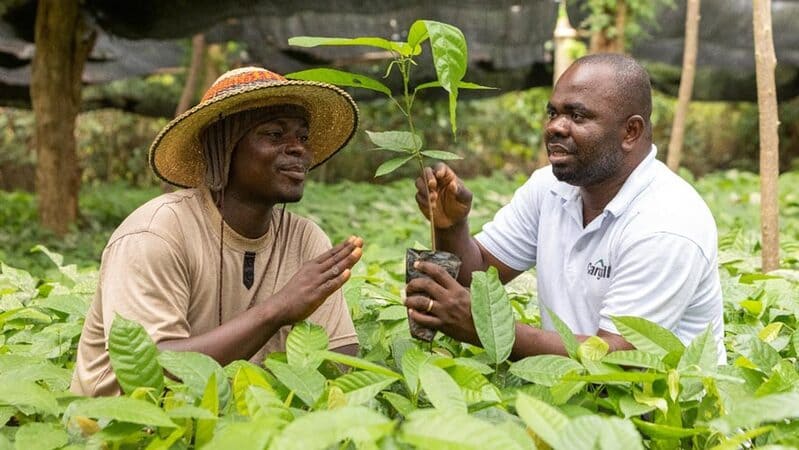 We believe cocoa farming and forests can co-exist — and our work in agroforestry is one example. In the last five years, nearly 22,000 cocoa farmers in our supply chain — like cocoa grower Ouatara — have started adopting agroforestry practices that reforest areas while also supplementing farmers’ incomes. It’s led to more than 1.2 million trees planted on farms that, as they grow and develop, have the potential to sequester nearly 137,000 metric tons of carbon dioxide equivalent by 2040.
We believe cocoa farming and forests can co-exist — and our work in agroforestry is one example. In the last five years, nearly 22,000 cocoa farmers in our supply chain — like cocoa grower Ouatara — have started adopting agroforestry practices that reforest areas while also supplementing farmers’ incomes. It’s led to more than 1.2 million trees planted on farms that, as they grow and develop, have the potential to sequester nearly 137,000 metric tons of carbon dioxide equivalent by 2040.
7. More consumers can trace their cocoa back to the farm.
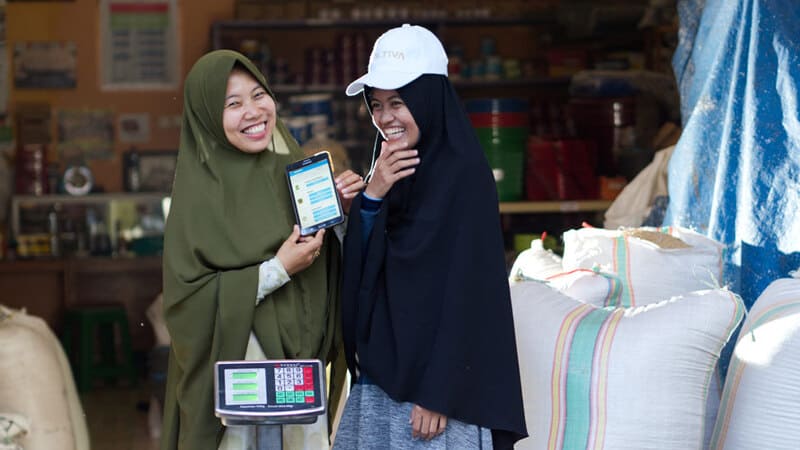 Consumers want to know their chocolate was made the right way. That is why we provide our customers with first-mile traceability — in other words, the opportunity to trace their cocoa in our direct supply chain. This, along with innovative tools like our CocoaWise™ Portal, are part of our efforts to increase transparency and give customers greater confidence that their cocoa was sourced sustainably.
Consumers want to know their chocolate was made the right way. That is why we provide our customers with first-mile traceability — in other words, the opportunity to trace their cocoa in our direct supply chain. This, along with innovative tools like our CocoaWise™ Portal, are part of our efforts to increase transparency and give customers greater confidence that their cocoa was sourced sustainably.
8. Mobile banking gives farmers and their organizations safer ways to handle money.
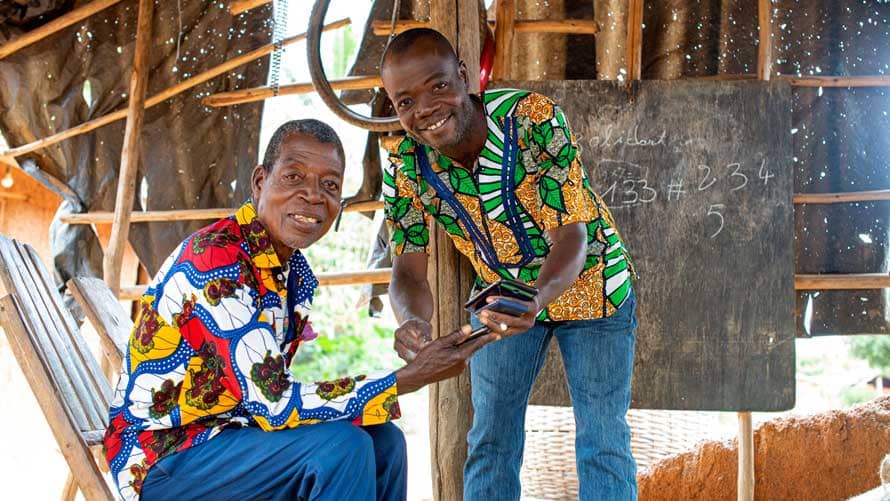 Cocoa farmers need safe and innovative ways to handle their hard-earned money. That is why last year alone we helped more than 56,000 farmers enroll in a mobile banking system. It gives them greater security and peace of mind they will be paid on time and in full — allowing them to better manage their income. And, as one farmer told us: “There is also a certain pride in receiving your money on your mobile.”
Cocoa farmers need safe and innovative ways to handle their hard-earned money. That is why last year alone we helped more than 56,000 farmers enroll in a mobile banking system. It gives them greater security and peace of mind they will be paid on time and in full — allowing them to better manage their income. And, as one farmer told us: “There is also a certain pride in receiving your money on your mobile.”
9. More partnerships means more progress for the cocoa sector.
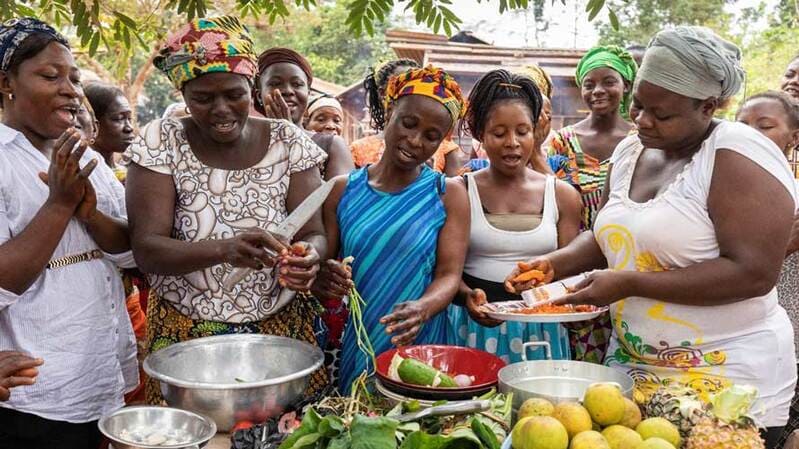 There’s an African saying: If you want to go fast, go alone. If you want to go far, go together. We want to go far, together with more than 60 partners — from NGOs and technical partners to social enterprises and financial institutions — who want the same thing: to help shape a more sustainable cocoa sector.
There’s an African saying: If you want to go fast, go alone. If you want to go far, go together. We want to go far, together with more than 60 partners — from NGOs and technical partners to social enterprises and financial institutions — who want the same thing: to help shape a more sustainable cocoa sector.
10. When we stay connected, we can do more for the cocoa sector.
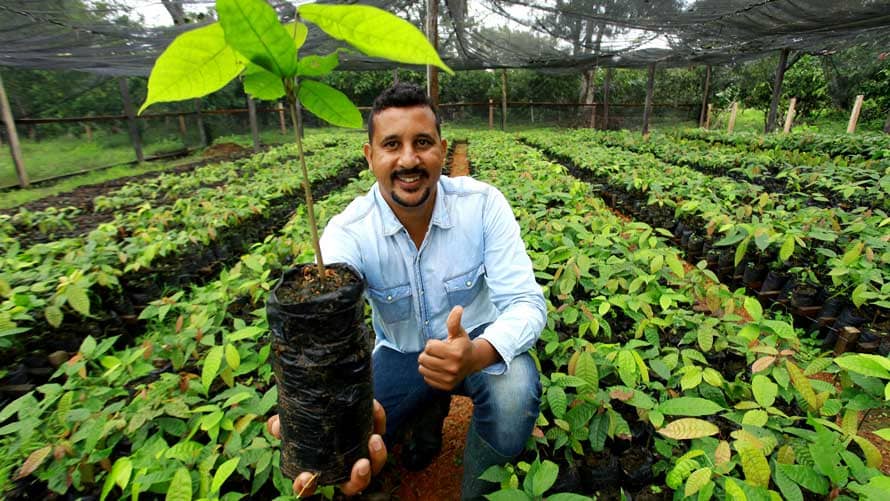 In cocoa communities, we have seen a future that is more interconnected than ever. So, moving forward, we’re leaning into these connections even more — using our unique role at the heart of the supply chain to bring together the people who can help the cocoa sector thrive, today and for years to come.
In cocoa communities, we have seen a future that is more interconnected than ever. So, moving forward, we’re leaning into these connections even more — using our unique role at the heart of the supply chain to bring together the people who can help the cocoa sector thrive, today and for years to come.
There are many reasons to celebrate progress over the last decade, but we also know we must do more. New challenges are surfacing that require new solutions to help the cocoa sector thrive.
As we look ahead, our progress only reinforces our deep belief: that through our collective power, we can create a more sustainable cocoa sector. We hope we’re making a believer out of you, too.
ABOUT THE AUTHOR
Kate Clancy is a global sustainability director for Cargill’s cocoa and chocolate business, focused on helping create a thriving cocoa sector for generations to come. She has more than a decade of experience in advancing sustainable supply chains within the food and agriculture sector. Kate is Canadian, was raised in Italy and now lives in the Netherlands with her husband and two daughters.
More stories
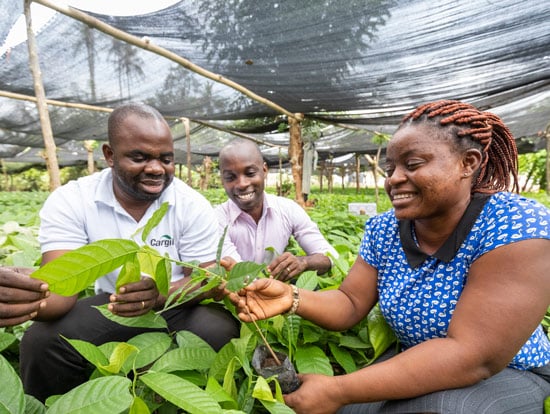
Connected for more
From farmers to communities, learn how we are bringing together the people who can help the cocoa sector thrive.
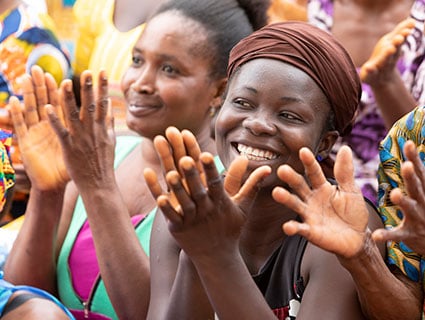
Cocoa Sustainability Progress Report
Find out more about our commitment to cocoa sustainability throughout the world.
What is ESG? A primer with Cargill’s new ESG Report.
ESG stands for “environmental, social and governance.” At Cargill, ESG is all about our commitment to creating a more sustainable world.

